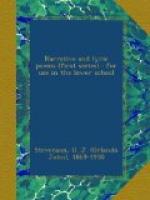[2] Sinais. See Exodus, xix and xx.
[3] Druid. The druids were the priests of the ancient Celts.
[4] benedicite. Blessing, benediction.
[5] No matter how engrossed we may be with worldly things, Nature is always influencing us for good.
[6] shrives. Hears confession and grants absolution.
[7] We give our lives in pursuit of foolish things. The cap and bells was a part of the costume of the court jester.
[8] nice. discriminating, able to make fine distinctions.
[9] chanticleer. A crowing cock. The bird that “sings clear.”
[10] rifts. Literally, clefts or fissures; used metaphorically here with reference to the effects of “passion and woe” on the soul.
[11] Sir Launfal. A Knight of King Arthur’s Round Table.
[12] Holy Grail. According to legend, the Holy Grail is the cup or bowl from which Christ drank at the Last Supper, and which was used by Joseph of Arimathea to receive the blood from Christ’s wounds when his body was removed from the cross. The Grail was taken to England by Joseph of Arimathea, and at his death it remained in the keeping of his descendants. But in the course of time, owing to the impurity of life of its guardians, the Grail disappeared; and thereafter it appeared only to those whose lives were free from sin. The search for the Grail was undertaken by many of the knights of the Round Table, but only one knight, Sir Galahad, was pure enough to see the vision.
[13] rushes. Rushes were used in Mediaeval times to strew the floors of the feudal castles.
[14] North Countree. The north of England.
[15] Pavilion and tent, as here used, refer to the trees.
[16] See Luke, xxi, 1-4.
[17] store. plenty.
[18] groined. The groin is the line made by the intersection of two arches.
[19] crypt. A subterranean cell or chapel.
[20] relief. Figures are said to be in relief when they project or stand out from the ground on which they are formed.
[21] arabesques. A style of ornament, representing flowers, fruit, and foliage, adopted from the Arabs.
[22] corbel. A projection from the face of a wall, supporting an arch or rafter above.
[23] gulf. The opening, or throat, of the chimney.
[24] Yule-log. A great log of wood laid, in ancient times, across the hearth-fire on Christmas Eve.
[25] burden. refrain.
[26] seneschal. High-steward; the officer who had charge of feasts and other ceremonies.
[27] surcoat. A cloak worn over the armour of a knight. The surcoat of a Christian knight, was generally white, with a large red cross displayed conspicuously ("blazoned”) upon it.
[28] He tried to forget the cold and snow, by calling to mind pictures of the hot desert.
[29] grewsome. horrible, hideous.




